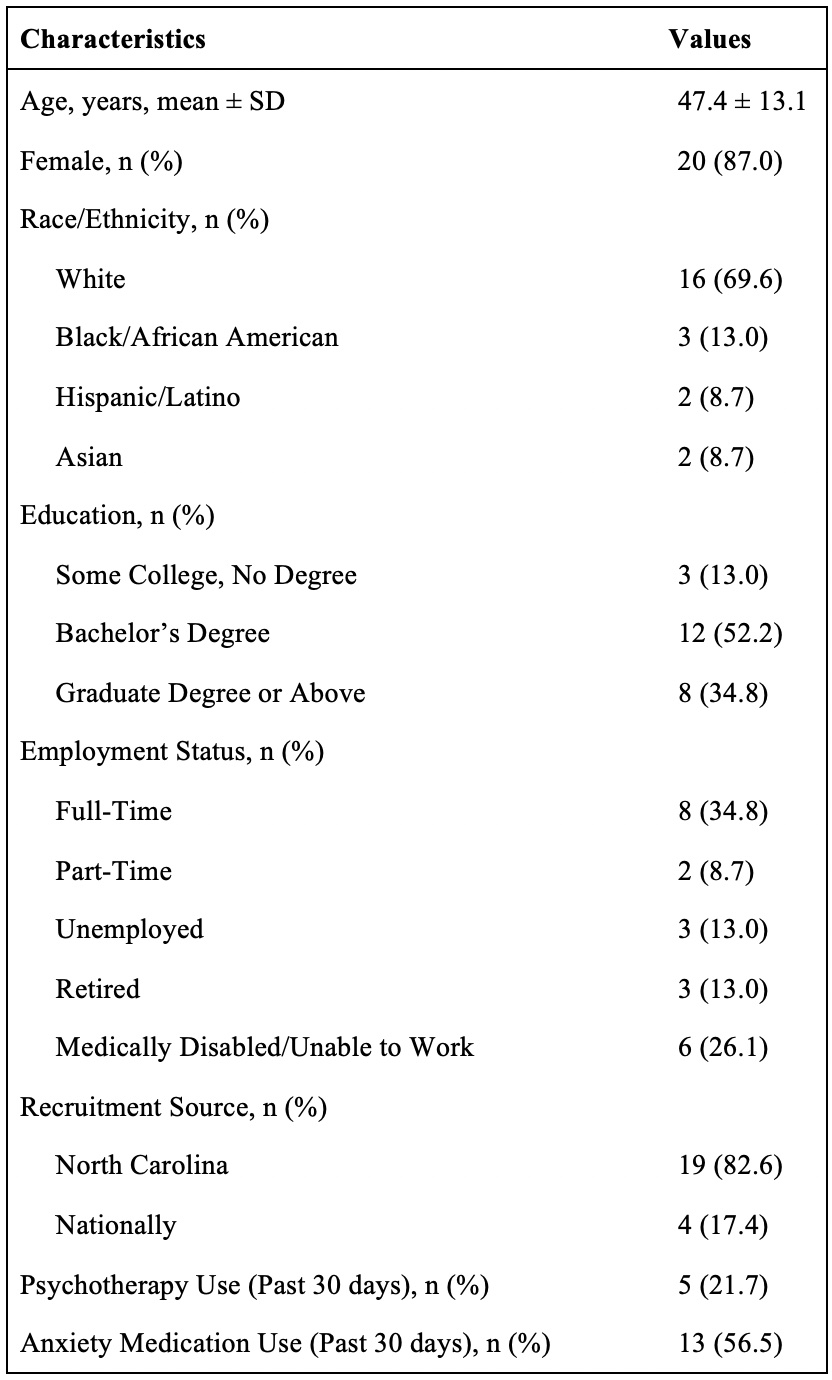Session Information
Date: Tuesday, November 9, 2021
Title: Patient Outcomes, Preferences, & Attitudes Poster IV: COVID-19 (1589–1613)
Session Type: Poster Session D
Session Time: 8:30AM-10:30AM
Background/Purpose: Systemic lupus erythematosus (SLE) is a chronic disease associated with significant symptom burden, including fatigue, anxiety, depression, pain, and negative impacts on health-related quality of life (HRQoL). The COVID-19 pandemic has resulted in additional stressors impacting the mental health and well-being of patients with SLE. Acceptance and Commitment Therapy (ACT) is a promising treatment approach that has shown efficacy in addressing many of the symptoms associated with SLE, such as such as depression, anxiety, and chronic pain. The goal of this pilot study was to develop and assess the feasibility and preliminary efficacy of ACT for Lupus, a novel online ACT-based virtual skills training program tailored for patients with lupus.
Methods: Participants with a diagnosis of SLE were primarily recruited through an academic healthcare system in North Carolina, as well as nationally in partnership with a large lupus advocacy organization. A total of 72 participants completed the baseline survey and were invited to attend two weekly one-hour webinar sessions in December 2020, which were delivered through a web-based platform. Educational content was tailored for patients with lupus and delivered by an experienced clinical psychologist who specializes in ACT. Topics and practice exercises encompassed ACT-principles of mindfulness, distress tolerance, self-care and advocacy, goal setting, and action planning. Patient-reported outcomes (PROs) including anxiety (General Anxiety Disorder-7; GAD-7), depression (Patient Health Questionnaire; PHQ-9), and disease-specific HRQoL (LupusQoL) were assessed at baseline and post-intervention. Additional questions in the follow-up survey assessed participant satisfaction with the program and suggestions/opportunities for refinement. Means and effect sizes (ES) with 95% confidence intervals (CIs) were computed for pre- and post- changes in PROs, adjusted for age, sex and baseline measurements (Table 2).
Results: Data was analyzed for a total of 23 individuals who participated in the program and submitted the end of study assessment survey. Most participants were women (86%), aged > 28 years, and recruited through the North Carolina system (82.6%) (Table 1). In pre- post- analyses of the ACT for Lupus pilot data, we found modest improvements in LupusQoL fatigue scores (ES=0.25) and reduced symptoms of anxiety as indicated by GAD-7 scores (ES= -0.26). Feedback from participants highlighted unmet needs for mindfulness-based programs, tailored to the unique experiences of patients with lupus. Participant feedback included suggestions to inform growth and expansion of the program and added flexibility for participants to access the program at their own pace in a self-directed format.
Conclusion: Preliminary results suggest that an adapted ACT-based virtual skills training program has potential to improve psychological and QoL outcomes among patients with lupus, especially in the face of additional stressors.
 Table 1: Participant characteristics (n=23)
Table 1: Participant characteristics (n=23)
 Table 2: Means (SD) and effect sizes for changes in outcomes from baseline to end of study (n=23)
Table 2: Means (SD) and effect sizes for changes in outcomes from baseline to end of study (n=23)
To cite this abstract in AMA style:
Englund T, Sheikh S, Cleveland B, McCormick E, Schiller C, Dickson T. ACT for Lupus: Pilot Study of a Novel Acceptance and Commitment Therapy (ACT) Online Program to Support Patients with Lupus During the COVID-19 Pandemic [abstract]. Arthritis Rheumatol. 2021; 73 (suppl 9). https://acrabstracts.org/abstract/act-for-lupus-pilot-study-of-a-novel-acceptance-and-commitment-therapy-act-online-program-to-support-patients-with-lupus-during-the-covid-19-pandemic/. Accessed .« Back to ACR Convergence 2021
ACR Meeting Abstracts - https://acrabstracts.org/abstract/act-for-lupus-pilot-study-of-a-novel-acceptance-and-commitment-therapy-act-online-program-to-support-patients-with-lupus-during-the-covid-19-pandemic/
